Kanji
Kanji (漢字, pronounced Hanzi in Chinese) are Chinese logographic characters used in the writing systems of several Asian language. The word "kanji" specifically refers to that subset used in Japanese, though the distinction is often ignored.
One of the most popular kind of tattoos are kanji tattoos. They are tattoos featuring Chinese and Japanese characters, and are almost always done by people who don't actually have any real understanding as to what they say. As a result, there are a large number of people walking around with tattoos that don't say exactly what they think. Finally, most tattoo professionals do not think highly of people who get kanji tattoos because almost all are people who people who picked them simply "because they look cool" rather than due to real personal meaning.
Sometimes, people try to get their name (or the name of a loved one), "tattooed in kanji." First of all, this can not normally be done—there is a separate syllabic system called katakana in Japanese for representing foreign words and names. This process entails a phonetic transcription, rather than a literal one. The kanji version is close, and similar methods are used for importing foreign names into Chinese culture, but definitely not the real thing. The best way to make sure your name is tattooed with its intended meaning is to get it tattooed in the language it was given to you in.
Related Articles
- 20 KANJIS:Does your kanji tattoo mean what you think it does?
- Tips for those who want kanji tattoos
- Japan
- Hiragana
- Katakana
External links
- Hanzi Smatter - Website about poorly written or translated kanji
